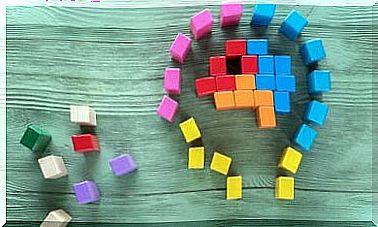What Does Anger Teach Us?

Anger is an emotion that we feel intensely within us. Among the various somatic sensations, it could give us a stomach block or a lump in the throat, things that prevent us from resolving the situation that caused it with clarity.
In reality, when we feel anger, it means that something is happening in our nervous system, in our blood and, therefore, in our whole body. Due to the presence of this emotion, hormones and neurotransmitters move and we mobilize for action. However, we must learn from it and not harm ourselves.
Anger, one emotion among many
Anger pushes us to release energy, to externalize it, because it transforms the deepest part of us into a sort of pressure cooker. When we do not open a channel to let everything evaporate, we can suffer severely, contaminating the other emotions, other thoughts and behaviors that we will assume from this moment onwards.
If we don’t find a solution for this emotion, we will feel stuck and disarmed, we will suffer and be attacked by frustration and helplessness. As with other emotions, we are responsible for our anger, there is no one to blame for its presence, however much we associate it with or project it onto someone.

Anger against others
Anger is an emotion that escapes us, that wants to get out, and for this reason we sometimes feel we cannot control it. It often emerges because of someone doing or saying something that bothers us.
It often happens to unleash our anger against the person who activated that emotion in us, so we behave in an impulsive and uncontrolled way, without measuring our actions and our words. However, this does not solve the situation, on the contrary: it causes conflicts and damage that we will probably regret shortly.
Anger against yourself
Other times, we direct anger towards ourselves. This happens when this emotion is activated due to a situation and not a person. In that case, the attack is directed at our person, we blame ourselves for the emergence of the annoying or unpleasant situation.
Not even anger against ourselves frees us from it, it makes us feel even worse. The anger, instead of disappearing, will grow even more within us, disorienting us due to the strong unresolved and self-destructive emotion.
“Anger is harmful for everyone, but especially for those who experience it”
(Lev Tolstoy)
The destructive anger
Anger is destructive when we don’t know how to resolve it. If we let ourselves be carried away by it in an impulsive way, we harm ourselves, ourselves and others. If we then repress it vehemently, it lurks within us, growing with the passage of time and hurting our image.
It is therefore necessary to learn to solve it and manage it, so that it does not destroy us. However, it is more important to find out where it comes from and why we try it. Only when we know this emotion in depth, will we be able to heal it and unearth it from within us.
“No matter what the doctors say, the frequent anger in humans is one of the traps of the enemy”
(Gabriel García Márquez)

An emotion that teaches
Anger always tells us that we are experiencing personal dissatisfaction, something unresolved that can even come from childhood. To understand its real origin, it is advisable to observe in which situations it appears and in which it remains asleep.
All situations are likely to have something in common, as this emotion often hides dissatisfaction, pain, disappointed expectations, feelings of inferiority, abandonment, frustration, lack of support, pursuit of perfection, etc.
If we observe our anger, it will show us what we need to work on, probably to fortify ourselves, accept failure, respect others, or feel satisfied. Only then will we stop feeling this unpleasant emotion.
“Take care of your emotions and never underestimate them”
(Robert Henri)
Channel and manage
It is important to know how to manage and deal with anger properly when it is already within you. You must avoid harm to yourself and others and, at the same time, you must be able to express it and feel relief for it. This has to do with emotional intelligence, that is, the ability to express, resolve and deal with without hurting anyone.
For this purpose, we advise you to find a physical activity that allows you to bring out the anger and, during physical exertion, to imagine pulling out all this anger that damages you; this exercise will make you feel better. You can also kick or punch a pillow, or throw stones and pay attention to what happens to your anger after you finish these activities.

You can also choose a safe place to shout and express yourself without anyone hearing you ; you can say aloud anything that helps you free her, knowing that no one will suffer. After these gestures, you will feel that the malaise that lived within you has disappeared.
Transform emotion into learning
Don’t forget to research the source of anger and learn what it has to teach you. Learning from your emotions is a way to grow. Knowing how to manage anger, express it without harming anyone (neither you nor others) and transforming it into learning means healing your person from the deepest inner wounds.
If you take the time to observe and recognize your emotions, you will have something to learn every day. It is important to learn how to manage them, as well as to learn from them, their origin and their reason, so that they no longer cause you discomfort or pain.
“When I say to control emotions, I mean the really stressful and limiting emotions. The act of feeling emotions is what makes our life wonderful. “
(Daniel Goleman)









